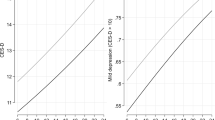Abstract
Objective
The objective of this study was to investigate medical students’ knowledge and attitudes towards depression.
Methods
Students attending their final year at Zagreb School of Medicine completed a set of standardized questionnaires, including attitudes towards psychiatric medication, attitudes towards depression, and personality inventory.
Results
In total, 199 students completed the questionnaire (response rate 77 %). Most medical students were only partially able to correctly identify major symptoms of depression, but did suggest referral to mental health specialists as the most appropriate course of action. They recognized social and biological causes of depression. Degree of correct identification of symptoms of depression correlated positively with non-stigmatizing attitudes towards depression and negatively with stigmatizing attitudes towards depression.
Conclusion
Students’ attitudes toward depression may influence their recognition of symptoms of depression. Incorporation of these findings in development of undergraduate medical curricula may improve students’ recognition of depression.
Similar content being viewed by others
References
Croatian Institute for Public Health and the Croatian Ministry of Health. Mental Disorders in Croatia 1st ed., 2011
Rojnic Kuzman M, Bolanca M, Rojnic Palavra I. General practice meeting the needs for psychiatric care in Croatia. Psychiatr Danub. 2010;22:57–63.
Korszun A, Dinos S, Ahmed K, et al. Medical student attitudes about mental illness: does medical-school education reduce stigma? Acad Psychiatry. 2012;36:197–204.
Mojtabai MD. Americans’ attitudes toward psychiatric medications: 1998–2006. Psychiatr Serv. 2009;60:1015–23.
Scheerder G, Van Audenhove C, Arensman E, et al. Community facilitators’ and (mental) health professionals’ attitudes towards depression: a pilot study in nine EAAD countries. Int J Soc Psychiatry. 2011;57:387–401.
Gosling SD, Rentfrow PJ, Swann Jr WB. A very brief measure of the Big-Five personality domains. J Res Pers. 2003;37:504–28.
Rong Y, Luscombe GM, Davenport TA, et al. Recognition and treatment of depression: a comparison of Australian and Chinese medical students. Soc Psychiatry Psychiatr Epidemiol. 2009;44:636–42.
Galka SW, Perkins DV, Butler N, et al. Medical students’ attitudes toward mental disorders before and after a psychiatric rotation. Acad Psychiatry. 2005;29:357–61.
Schomerus G, Schwahn C, Holzinger A, et al. Evolution of public attitudes about mental illness: a systematic review and meta-analysis. Acta Psychiatr Scand. 2012;125:440–52.
Weiss Roberts L, ShenYu Bandstra B. Addressing stigma to strengthen psychiatric education. Acad Psychiatry. 2012;36:347–50.
Disclosure
The authors have no conflicts of interest.
Author information
Authors and Affiliations
Corresponding author
Rights and permissions
About this article
Cite this article
Kuzman, M.R., Bosnjak, D., Vokal, P. et al. Can Medical Students Recognize Depression? A Survey at the Zagreb School of Medicine. Acad Psychiatry 38, 312–315 (2014). https://doi.org/10.1007/s40596-014-0109-8
Received:
Accepted:
Published:
Issue Date:
DOI: https://doi.org/10.1007/s40596-014-0109-8




